情态动词巩固提升复习(一)(有答案)
- 格式:docx
- 大小:24.68 KB
- 文档页数:12
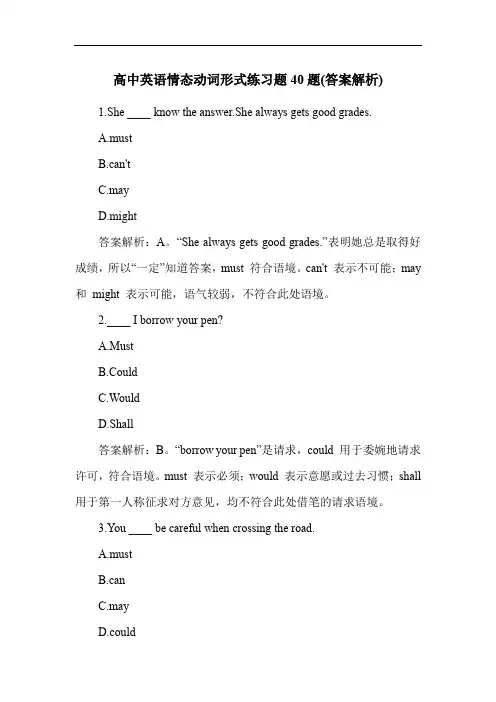
高中英语情态动词形式练习题40题(答案解析)1.She ____ know the answer.She always gets good grades.A.mustB.can'tC.mayD.might答案解析:A。
“She always gets good grades.”表明她总是取得好成绩,所以“一定”知道答案,must 符合语境。
can't 表示不可能;may 和might 表示可能,语气较弱,不符合此处语境。
2.____ I borrow your pen?A.MustB.CouldC.WouldD.Shall答案解析:B。
“borrow your pen”是请求,could 用于委婉地请求许可,符合语境。
must 表示必须;would 表示意愿或过去习惯;shall 用于第一人称征求对方意见,均不符合此处借笔的请求语境。
3.You ____ be careful when crossing the road.A.mustB.canC.mayD.could答案解析:A。
过马路时“一定”要小心,must 表示必须,符合语境。
can 表示能够;may 表示可能;could 表示能够( 语气更委婉),均不如must 强烈。
4.He ____ come to the party if he finishes his homework.A.mayB.mustC.can'tD.would答案解析:A。
“if he finishes his homework”表示一种可能性,may 表示可能,符合语境。
must 表示必须;can't 表示不可能;would 表示意愿或过去习惯,均不符合。
5.They ____ have gone on vacation.They haven't been at school for days.A.mustB.mayC.can'tD.could答案解析:A。
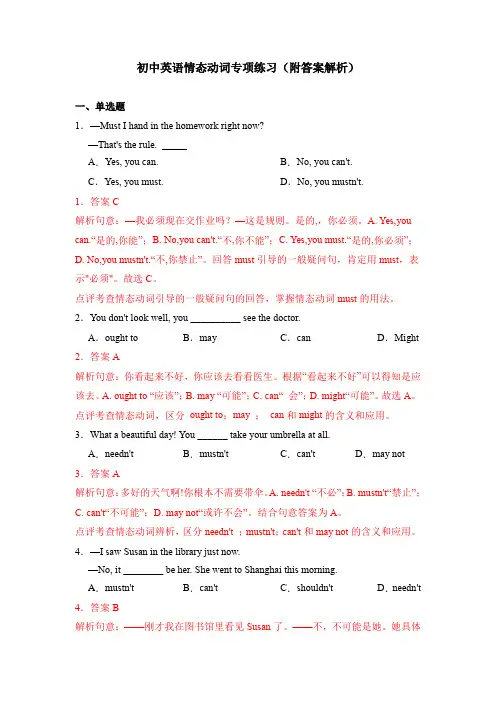
初中英语情态动词专项练习(附答案解析)一、单选题1.—Must I hand in the homework right now?—That's the rule.A.Yes, you can.B.No, you can't.C.Yes, you must.D.No, you mustn't.1.答案C解析句意:—我必须现在交作业吗?—这是规则。
是的,,你必须。
A. Yes,you can.“是的,你能”;B. No,you can't.“不,你不能”;C. Yes,you must.“是的,你必须”;D. No,you mustn't.“不,你禁止”。
回答must引导的一般疑问句,肯定用must,表示"必须"。
故选C。
点评考查情态动词引导的一般疑问句的回答,掌握情态动词must的用法。
2.You don't look well, you __________ see the doctor.A.ought to B.may C.can D.Might 2.答案A解析句意:你看起来不好,你应该去看看医生。
根据“看起来不好”可以得知是应该去。
A. ought to “应该”;B. may “可能”;C. can“ 会”;D. might“可能”。
故选A。
点评考查情态动词,区分ought to;may ;can和might的含义和应用。
3.What a beautiful day! You ______ take your umbrella at all.A.needn't B.mustn't C.can't D.may not 3.答案A解析句意:多好的天气啊!你根本不需要带伞。
A. needn't “不必”;B. mustn't“禁止”;C. can't“不可能”;D. may not“或许不会”。
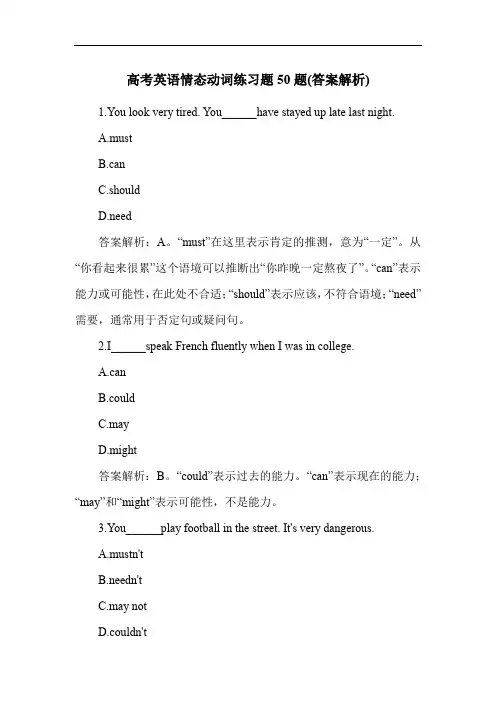
高考英语情态动词练习题50题(答案解析)1.You look very tired. You______have stayed up late last night.A.mustB.canC.shouldD.need答案解析:A。
“must”在这里表示肯定的推测,意为“一定”。
从“你看起来很累”这个语境可以推断出“你昨晚一定熬夜了”。
“can”表示能力或可能性,在此处不合适;“should”表示应该,不符合语境;“need”需要,通常用于否定句或疑问句。
2.I______speak French fluently when I was in college.A.canB.couldC.mayD.might答案解析:B。
“could”表示过去的能力。
“can”表示现在的能力;“may”和“might”表示可能性,不是能力。
3.You______play football in the street. It's very dangerous.A.mustn'tB.needn'tC.may notD.couldn't答案解析:A。
“mustn't”表示禁止,不允许在街道上踢足球,因为很危险。
“needn't”表示不必;“may not”表示可能不;“couldn't”表示过去不能。
4.______I borrow your pen?A.MayB.MustC.NeedD.Will答案解析:A。
“May I...?”表示请求许可,“我可以借你的笔吗?”“Must”表示必须,“Need”表示需要,“Will”表示将来或意愿,都不符合请求许可的语境。
5.The light is on. He______be at home.A.mustB.canC.shouldD.need答案解析:A。
“must”表示肯定的推测,灯亮着,所以他一定在家。
“can”表示能力或可能性,不太确定;“should”表示应该,不准确;“need”需要,不符合语境。
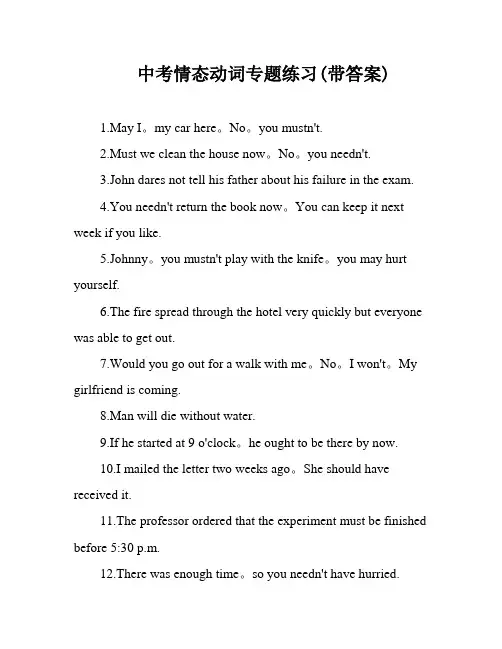
中考情态动词专题练习(带答案)1.May I。
my car here。
No。
you mustn't.2.Must we clean the house now。
No。
you needn't.3.John dares not tell his father about his failure in the exam.4.You needn't return the book now。
You can keep it next week if you like.5.Johnny。
you mustn't play with the knife。
you may hurt yourself.6.The fire spread through the hotel very quickly but everyone was able to get out.7.Would you go out for a walk with me。
No。
I won't。
My girlfriend is coming.8.Man will die without water.9.If he started at 9 o'clock。
he ought to be there by now.10.I mailed the letter two weeks ago。
She should have received it.11.The professor ordered that the experiment must be finished before 5:30 p.m.12.There was enough time。
so you needn't have hurried.13.Tom was a diligent boy。
He was able to go to school even though it was raining hard.14.Do I need to go back before lunch。
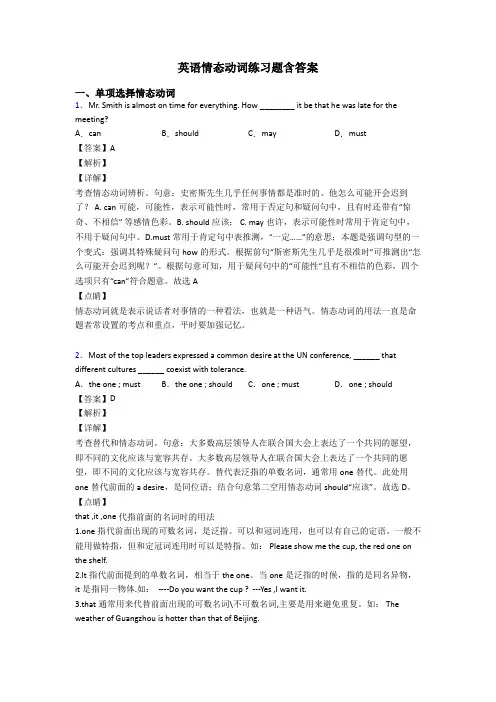
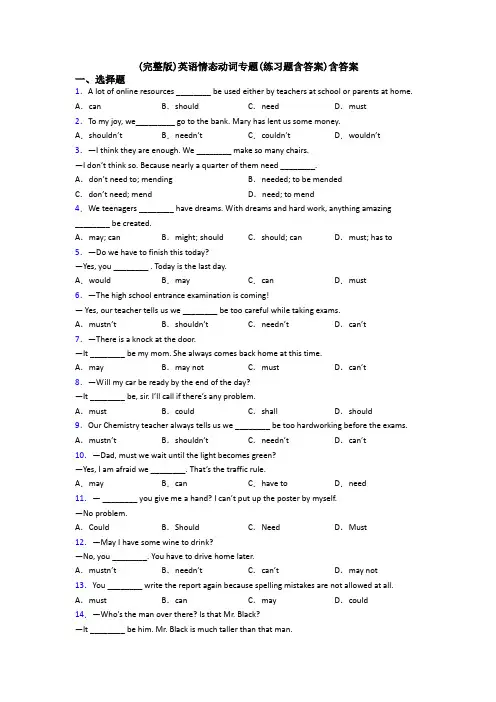
(完整版)英语情态动词专题(练习题含答案)含答案一、选择题1.A lot of online resources ________ be used either by teachers at school or parents at home. A.can B.should C.need D.must2.To my joy, we_________ go to the bank. Mary has lent us some money.A.shouldn’t B.needn’t C.couldn’t D.wouldn’t3.—I think they are enough. We ________ make so many chairs.—I don’t think so. Because nearly a quarter of them need ________.A.don’t need to; mending B.needed; to be mendedC.don’t need; mend D.need; to mend4.We teenagers ________ have dreams. With dreams and hard work, anything amazing________ be created.A.may; can B.might; should C.should; can D.must; has to 5.—Do we have to finish this today?—Yes, you ________ . Today is the last day.A.would B.may C.can D.must6.—The high school entrance examination is coming!— Yes, our teacher tells us we ________ be too careful while taking exams.A.mustn’t B.shouldn’t C.needn’t D.can’t 7.—There is a knock at the door.—It ________ be my mom. She always comes back home at this time.A.may B.may not C.must D.can’t8.—Will my car be ready by the end of the day?—It ________ be, sir. I’ll call if there’s any problem.A.must B.could C.shall D.should9.Our Chemistry teacher always tells us we ________ be too hardworking before the exams. A.mustn’t B.shoul dn’t C.needn’t D.can’t 10.—Dad, must we wait until the light becomes green?—Yes, I am afraid we ________. That’s the traffic rule.A.may B.can C.have to D.need11.—________ you give me a hand? I can’t put up the poster by myself.—No problem.A.Could B.Should C.Need D.Must 12.—May I have some wine to drink?—No, you ________. You have to drive home later.A.mustn’t B.needn’t C.can’t D.may not 13.You ________ write the report again because spelling mistakes are not allowed at all. A.must B.can C.may D.could 14.—Who’s the man over there? Is that Mr. Black?—It ________ be him. Mr. Black is much taller than that man.A.may B.must C.can’t D.mustn’t15.If you buy your mum an iRobot floor cleaner, she ________ sweep the floor every day. A.can’t B.mustn’t C.ne edn’t D.shouldn’t 16.— Zoe, what do you think is the greatest advantage of shopping online?— At least I ______ spend much time going from shop to shop.A.shouldn’t B.can’t C.needn’t D.mustn’t 17.—Have you decided to take up teaching as career after graduation?—I ________ go abroad for further education instead. But it depends.A.must B.should C.may D.shall18.The boy is very brave.I ________ he ________ the tall tree.A.dare say; dares to climbB.dare to say; dare climbingC.dare saying; dares climbD.dare to say; dares climbed19.---Will you be back early this evening?---Yes, but I ________ be a little late. Our boss sometimes has extra work for us.A.may B.must C.need D.will20.We’ve discussed every detail of this plan and have got everything ready. Bu t still something __________ go wrong. We still have to be very careful.A.must B.should C.would D.may 21.—Amy, I hear you've got many foreign coins._______ I have a look?—Of course, I'll fetch them for you.A.May B.MustC.Should D.Need22.My bike was broken yesterday,so I____walk home.A.might B.had to C.must D.could23.Dr. Zhong Nanshan once said, "To prevent the spread of this disease, we________never be too careful."A.can B.may C.must D.should 24.Think twice before making a decision, or you __________ get into trouble.A.may B.can't C.shouldn't D.mustn't 25.Exercise is helpful but it ________ be regular (规律的) exercise.A.must B.may C.can D.need26.— Is the boy over there Tom? He often wears a jacket like that.— It _______ be him. He is absent from school today.A.needn’t B.shouldn’t C.mustn’t D.can’t 27.—How do you like my new dress?—Well, if I ________ say, it is not suitable for you.A.may B.must C.have to D.should28.—Must the children leave at six tomorrow morning?—No, they _______. They can have more time to get ready for the trip.A.can’t B.needn’t C.mustn’t D.may not 29.—Why didn’t you tell it to me earlier?— Why ________ I? I want to have my own secret.A.can B.may C.should D.shall 30.—Mum, why do I have to wear a mask before entering the supermarket?—For your health and safety, you ________ be too careful.A.shouldn’t B.can’t C.mustn’t D.needn’t 31.—What is that young lady’s job?—She ________ be a nurse, I’m not sure.A.must B.may C.need D.would32.You _________ smoke here! Look at the sign. It says "No smoking".A.needn't B.mustn't C.can D.may33.We've discussed every detail of this plan and have got everything ready. But still something ________ go wrong. We still have to be very careful.A.must B.should C.would D.may34.—Suzy described every detail of the accident just now.—Her memory ________ be completely back.A.shall B.need C.must D.could35.—Is that Mr Zhou?—It ________ be him. He has gone to Beijing.A.can B.may C.can’t D.shouldn’t 36.Most young people like shopping online because they ________ spend much time going from shop to shop.A.needn’t B.can’t C.mustn’t D.shouldn’t37.—I don’t care what people think.—Well, you _______ . Some opinions are worth weighing.A.should B.might C.could D.would38.—In China, many parents complain that their children have to stay up late to do the homework.—Don’t worry. The government has realized the problem. I’m sure there ________ be good news soon.A.can B.should C.need D.must39.To avoid ________, we’d better ________ the parents’ meeting online.A.gather; hold B.gathering; hold C.gather; holding D.to gather; to hold 40.—Seventy dollars for such a dress! You ________ be joking!—I’m serious. It’s made of silk from Hangzhou.A.must B.need C.will D.can41.Look at the floor, Tom! ________ you watch TV while having a meal?A.Should B.Could C.Must D.May42.Cars ________ give way to walkers on some roads in Binhai, or the drivers will be fined. A.may B.will C.can D.must 43.You’ve got an A in the maths test again. You ________ be good at it.A.can B.may C.must D.should 44.Mr. Black ________ be at home now. He went abroad on vacation last Friday.A.can’t B.mustn’t C.needn’t D.shouldn’t 45.— The sandstorm in Beijing is so serious this year.— Yes, I wonder when we ________ worry about the air we breathe.A.can’t B.mustn’t C.needn’t D.shouldn’t 46.For the safety of the passengers, objects like guns ________ be carried on board. A.may not B.needn’t C.might not D.mustn’t 47.—The article says that a person’s animal sign decides his personality.—You ________ read it for fun, but don’t believe in that.A.can B.must C.shouldn’t D.needn’t 48.—How beautiful the winter jasmines (迎春花) are!—Yes. These golden-yellow flowers ________ be widely seen in my city in March.A.must B.can C.would D.should 49.—Mum, I bought some strawberries on my way home.—Oh, you’re so sweet. But the strawberries ________ be put into the fridge for freshness. A.must B.can C.may D.need50.—Will Jim come to Yangzhou for a holiday?—He ________come and it depends on how much homework he will have.A.may B.should C.must D.need【参考答案】***试卷处理标记,请不要删除一、选择题1.A解析:A【详解】句意:很多在线资源既可以供学校的老师使用,也可以供家长在家使用。
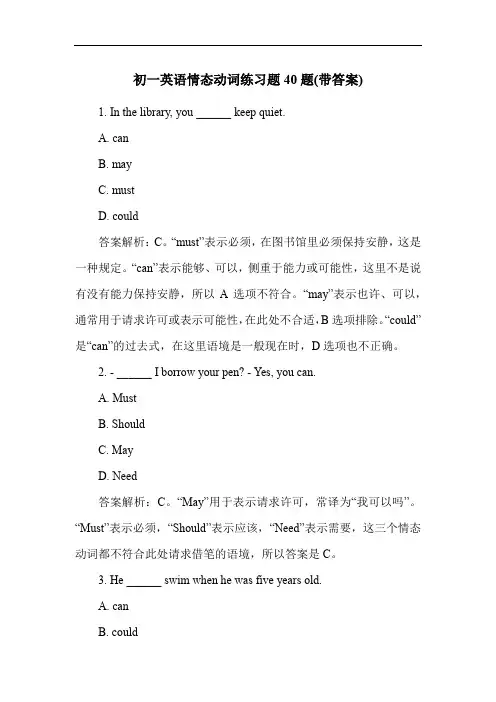
初一英语情态动词练习题40题(带答案)1. In the library, you ______ keep quiet.A. canB. mayC. mustD. could答案解析:C。
“must”表示必须,在图书馆里必须保持安静,这是一种规定。
“can”表示能够、可以,侧重于能力或可能性,这里不是说有没有能力保持安静,所以A选项不符合。
“may”表示也许、可以,通常用于请求许可或表示可能性,在此处不合适,B选项排除。
“could”是“can”的过去式,在这里语境是一般现在时,D选项也不正确。
2. - ______ I borrow your pen? - Yes, you can.A. MustB. ShouldC. MayD. Need答案解析:C。
“May”用于表示请求许可,常译为“我可以吗”。
“Must”表示必须,“Should”表示应该,“Need”表示需要,这三个情态动词都不符合此处请求借笔的语境,所以答案是C。
3. He ______ swim when he was five years old.A. canB. couldC. mayD. might答案解析:B。
“could”是“can”的过去式,句中提到他五岁的时候,是过去的时间,所以要用“could”表示过去有能力做某事。
“can”是一般现在时,A选项不符合。
“may”和“m ight”表示也许、可能,和能力无关,C和D选项排除。
4. You ______ be late for school.A. should notB. can notC. may notD. need not答案解析:A。
“should not”表示不应该,你不应该上学迟到,这是一种告诫。
“can not”表示不能,侧重于没有能力做某事,这里不是能力问题,B选项错误。
“may not”表示也许不,“need not”表示不需要,都不符合此处语境,C和D选项不合适。
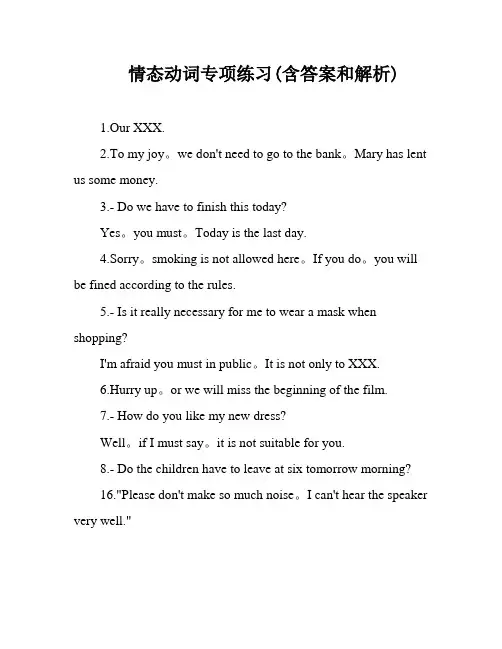
情态动词专项练习(含答案和解析)1.Our XXX.2.To my joy。
we don't need to go to the bank。
Mary has lent us some money.3.- Do we have to finish this today?Yes。
you must。
Today is the last day.4.Sorry。
smoking is not allowed here。
If you do。
you will be fined according to the rules.5.- Is it really necessary for me to wear a mask when shopping?I'm afraid you must in public。
It is not only to XXX.6.Hurry up。
or we will miss the beginning of the film.7.- How do you like my new dress?Well。
if I must say。
it is not suitable for you.8.- Do the children have to leave at six tomorrow morning?16."Please don't make so much noise。
I can't hear the speaker very well."17."We've discussed every detail of this plan and have got everything ready。
But still something may go wrong。
We still have to be very careful."18."XXX。
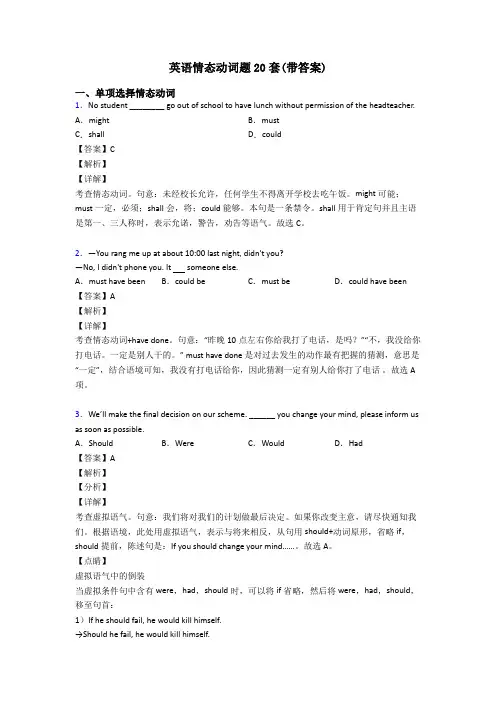
英语情态动词题20套(带答案)一、单项选择情态动词1.No student ________ go out of school to have lunch without permission of the headteacher. A.might B.mustC.shall D.could【答案】C【解析】【详解】考查情态动词。
句意:未经校长允许,任何学生不得离开学校去吃午饭。
might可能;must一定,必须;shall会,将;could能够。
本句是一条禁令。
shall用于肯定句并且主语是第一、三人称时,表示允诺,警告,劝告等语气。
故选C。
2.—You rang me up at about 10:00 last night, didn't you?—No, I didn't phone you. It someone else.A.must have been B.could be C.must be D.could have been 【答案】A【解析】【详解】考查情态动词+have done。
句意:“昨晚10点左右你给我打了电话,是吗?”“不,我没给你打电话。
一定是别人干的。
” must have done 是对过去发生的动作最有把握的猜测,意思是“一定”,结合语境可知,我没有打电话给你,因此猜测一定有别人给你打了电话。
故选A 项。
3.We’ll make the final decision on our scheme. ______ you change your mind, please inform us as soon as possible.A.Should B.Were C.Would D.Had【答案】A【解析】【分析】【详解】考查虚拟语气。
句意:我们将对我们的计划做最后决定。
如果你改变主意,请尽快通知我们。
根据语境,此处用虚拟语气,表示与将来相反,从句用should+动词原形,省略if,should提前,陈述句是:If you should change your mind……。
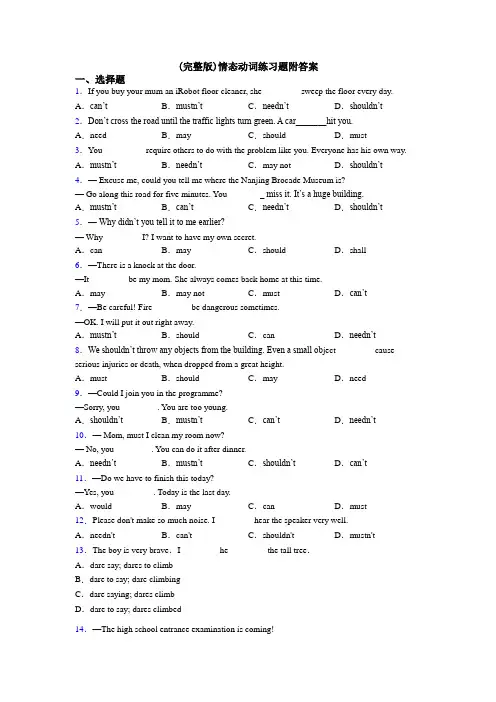
(完整版)情态动词练习题附答案一、选择题1.If you buy your mum an iRobot floor cleaner, she ________ sweep the floor every day. A.can’t B.mustn’t C.needn’t D.shouldn’t 2.Don’t cross the road until the traffic lights turn green. A car_______hit you.A.need B.may C.should D.must3.You ________ require others to do with the problem like you. Everyone has his own way. A.mustn’t B.needn’t C.may not D.shouldn’t 4.— Excuse me, could you tell me where the Nanjing Brocade Museum is?— Go along this road for five minutes. You ________ miss it. It’s a huge building. A.mustn’t B.can’t C.needn’t D.shouldn’t 5.—Why didn’t you tell it to me earlier?— Why ________ I? I want to have my own secret.A.can B.may C.should D.shall 6.—There is a knock at the door.—It ________ be my mom. She always comes back home at this time.A.may B.may not C.must D.can’t7.—Be careful! Fire ________ be dangerous sometimes.—OK. I will put it out right away.A.mustn’t B.should C.can D.needn’t 8.We shouldn’t throw any objects from the building. Even a small ob ject ________ cause serious injuries or death, when dropped from a great height.A.must B.should C.may D.need 9.—Could I join you in the programme?—Sorry, you ________. You are too young.A.shouldn’t B.mustn’t C.can’t D.needn’t 10.— Mom, must I clean my room now?— No, you ________. You can do it after dinner.A.needn’t B.mustn’t C.shouldn’t D.can’t 11.—Do we have to finish this today?—Yes, you ________ . Today is the last day.A.would B.may C.can D.must 12.Please don't make so much noise. I ________ hear the speaker very well.A.needn't B.can't C.shouldn't D.mustn't 13.The boy is very brave.I ________ he ________ the tall tree.A.dare say; dares to climbB.dare to say; dare climbingC.dare saying; dares climbD.dare to say; dares climbed14.—The high school entrance examination is coming!—Yes, our teacher tells us we _______ be too careful while taking exams.A.mustn't B.shouldn't C.needn't D.can't15.When I was young, my father ___________ take me to climb the hill which was not far from our house.A.may B.must C.would D.should16.My bike was broken yesterday,so I____walk home.A.might B.had to C.must D.could 17.—Would you please________in that way? That’s not safe!—Sorry. I won’t do it any more.A.not driving B.not to drive C.no driving D.not drive 18.—Will your mother be at home this Saturday?—Hard to say. She _______go to the countryside to see my grandparents.A.must B.may C.can D.would19.Think twice before making a decision, or you __________ get into trouble.A.may B.can't C.shouldn't D.mustn't20.You'd better __________ hard from now on, __________ you will fail the exam. A.work; and B.working; or C.working; and D.work; or 21.—Excuse me. I haven’t finished reading the book yet. May I keep it a bit longer?— Sorry, you ________. You must return it on time.A.needn’t B.can’t C.won’t D.shouldn’t 22.— Listen! Tom ________ be listening to the music while doing his homework.—Let’s go upstairs to remind him to turn it off.A.should B.could C.would D.must 23.—Suzy described every detail of the accident just now.—Her memory ________ be completely back.A.shall B.need C.must D.could24.Most young people like shopping online because they ________ spend much time going from shop to shop.A.needn’t B.can’t C.mustn’t D.shouldn’t 25.—In China, many parents complain that their children have to stay up late to do the homework.—Don’t worry. The government has realized the problem. I’m sure there ________ be good news soon.A.can B.should C.need D.must26.I think all the students love the weekends because, to them, they ________ get up early on Saturdays or Sundays.A.mustn’t B.don’t need C.needn’t D.can’t27.— Is the boy over there Tom? He often wears a jacket like that.— It _______ be him. He is absent from school today.A.needn’t B.shouldn’t C.mustn’t D.can’t28.When people are waiting at the zebra crossing, cars and buses ________ wait and let them go first.A.must B.may C.can D.need29.Hurry up, or we ________ miss the beginning of the film.A.should B.must C.may D.have to 30.—Will dad arrive home at 6 o’cl ock to have dinner with us this evening?— I think he will, but he ________ not. Sometimes he works extra hours.A.can B.must C.need D.may31.A hard-working man ________ become a great scientist, but a great scientist ________ be a hard-working man.A.can’t; can B.may not; must C.can’t; must D.may not; can 32.Cars ________ give way to walkers on some roads in Binhai, or the drivers will be fined. A.may B.will C.can D.must33.—The article says that a person’s animal sign decides his personality.—You ________ read it for fun, but don’t believe in that.A.can B.must C.shouldn’t D.needn’t 34.—How beautiful the winter jasmines (迎春花) are!—Yes. These golden-yellow flowers ________ be widely seen in my city in March.A.must B.can C.would D.should 35.—Mum, I bought some strawberries on my way home.—Oh, you’re so sweet. But the strawberries ________ be put into the fridge for freshness. A.must B.can C.may D.need36.— What do you think of the show yesterday?— Some of them were really good but others ________ be better.A.will B.must C.need D.can37.—In China, many students have to stay up late to do their homework.—No worries. The government has realized the problem. I’m sure there ________ be good news soon.A.can B.should C.must D.need 38.—Who’s the man over there? Is that Mr. Black?—It ________ be him. Mr. Black is much taller than that man.A.may B.must C.can’t D.mustn’t39.We teenagers ________ have dreams. With dreams and hard work, anything amazing________ be created.A.may; can B.might; should C.should; can D.must; has to 40.—Shall I tell him the change of the time right now?—I’m afraid you ________, otherwise he will be late for the meeting.A.can B.may C.must D.need【参考答案】一、选择题1.C解析:C【详解】句意:如果你给你妈妈买一台扫地机器人,她就不必每天扫地了。
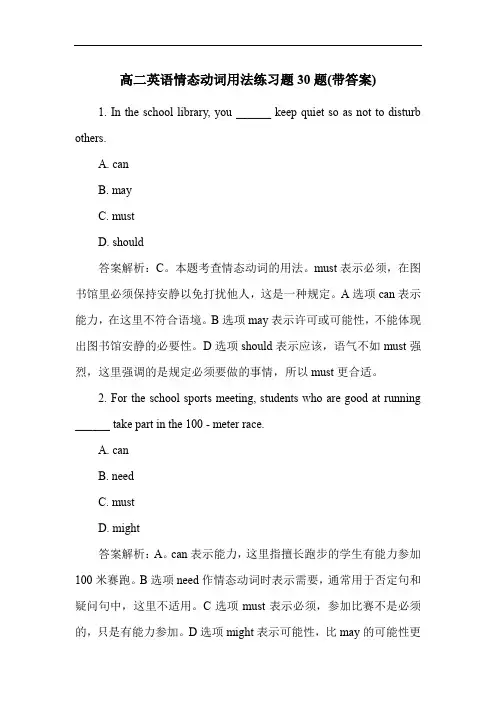
高二英语情态动词用法练习题30题(带答案)1. In the school library, you ______ keep quiet so as not to disturb others.A. canB. mayC. mustD. should答案解析:C。
本题考查情态动词的用法。
must表示必须,在图书馆里必须保持安静以免打扰他人,这是一种规定。
A选项can表示能力,在这里不符合语境。
B选项may表示许可或可能性,不能体现出图书馆安静的必要性。
D选项should表示应该,语气不如must强烈,这里强调的是规定必须要做的事情,所以must更合适。
2. For the school sports meeting, students who are good at running ______ take part in the 100 - meter race.A. canB. needC. mustD. might答案解析:A。
can表示能力,这里指擅长跑步的学生有能力参加100米赛跑。
B选项need作情态动词时表示需要,通常用于否定句和疑问句中,这里不适用。
C选项must表示必须,参加比赛不是必须的,只是有能力参加。
D选项might表示可能性,比may的可能性更小,这里说的是有能力参加而不是可能参加。
3. When you are in the art class, you ______ use the colored pencils to draw pictures.A. canB. mustC. shouldD. may答案解析:D。
may表示许可,在美术课上可以使用彩色铅笔画画,表示一种许可。
A选项can虽然也有可以的意思,但更侧重于能力方面。
B选项must表示必须,使用彩色铅笔不是必须的。
C选项should表示应该,这里表达许可用may更合适。
4. In the school band, Tom ______ play the guitar very well.A. canB. mayC. mustD. should答案解析:A。
情态动词专项练习(附答案)She。
be in the kitchen。
I saw her there just now.A。
mayB。
mustC。
can'tD。
should答案】A解析】【分析】句意:——妈妈现在在哪里?——她可能在厨房。
may表示“可能”,XXX表示“不可能”,must表示“一定”,should表示“应该”,根据I saw her there just now.我刚才在那里看到她,可以推断她现在可能还在那里,用may,故选A。
点评】此题考查情态动词的推测用法。
注意理解句意,根据上下文语境确定所使用的情态动词。
5.—Do you think I can borrow your bike for a week?Sorry。
you。
not。
I need it myself.A。
XXX答案】C解析】【分析】句意:——你觉得我能借用你的自行车一个星期吗?——对不起,你可能不能。
XXX表示能够,must 表示必须,need表示需要,may表示可能,根据I need itmyself.我自己需要用,可以推断你可能不能借用,用may,故选C。
点评】此题考查情态动词的推测用法。
注意理解句意,根据上下文语境确定所使用的情态动词。
5.那个骑马的女孩不可能是XXX,因为她的左腿在昨天的事故中受了重伤。
因此,可以推测她不可能骑马,选项C 表示否定的推测,所以选C。
6.我们已经点了太多的食物,我不能再吃了。
选项A表示不能,符合句意,所以选A。
对方提议将剩余的食物带回家,表示不浪费,也是可以接受的。
5.那个骑马的女孩可能不是XXX,因为她的左腿在昨天的事故中受了重伤。
因此,可以推测她不可能骑马,选项C 表示否定的推测,所以选C。
6.我们已经点了太多的食物,我不能再吃了。
选项A表示不能,符合句意,所以选A。
对方提议将剩余的食物带回家,表示不浪费,也是一个好主意。
1.今天暑假你有什么计划吗?我还没有确定,但可能会去台湾旅行。
高考英语情态动词练习题50题(带答案)1. You ______ be tired after working for eight hours without a break.A. canB. mayC. mustD. should答案解析:C。
must表示肯定的推测,根据题意,连续工作八小时不休息肯定会累,所以这里用must。
A选项can表示能力或可能性,通常用于否定句和疑问句中表示推测,这里不符合语境。
B选项may表示可能,可能性较弱,没有must肯定。
D选项should表示应该,与题意推测累不累不相关。
2. - ______ I use your pen? - Sure. Here you are.A. MustB. MayC. NeedD. Should答案解析:B。
May用于征求对方许可,在这个句子中是询问是否可以使用对方的笔,符合语境。
A选项Must表示必须,C选项Need 表示需要,D选项Should表示应该,都不符合这个征求许可的语境。
3. He ______ speak English when he was five years old.A. couldB. canC. mayD. must答案解析:A。
could是can的过去式,表示过去的能力,句中提到他五岁的时候,是过去的时间,所以用could表示过去能说英语。
B选项can表示现在的能力。
C选项may表示可能,D选项must表示肯定的推测,都不符合这里表示过去能力的语境。
4. - Where is Tom? - He ______ be in the library. I'm not sure.A. canB. mayC. mustD. should答案解析:B。
may表示可能性,根据I'm not sure可知说话者不确定,只是一种可能,所以用may。
A选项can用于否定句和疑问句中表示推测,这里是肯定句。
(完整版)情态动词专项练习(含答案)1. I promised to get there before 5 o’clock, but now the rain is pouring down. They ______ for me impatiently.A. may waitB. ought to waitC. could waitD. must be waiting2. He was very brave. Even though she’d hurt her leg, she ________ go back alone.A. couldB. mightC. have toD. was able to3. You ________ pay too much attention to your reading skill, as it is so important.A. cannotB. shouldC. mustD. needn’t4. I’ve tried several times, but the car just _______.A. doesn’t startB. wouldn’t startC. won’t startD. didn’t start5. Always the old lady ______ sit for hours doing nothing at all.A. was used toB. wouldC. used toD. should6. There used to be a small school,___________?A. was thereB. wasn’t itC. usedn’t thereD. usedn’t it7. Our house is on the top of the hill, so in summer the wind _____ be pretty cold.A. mustB. canC. ought toD. need8. Haven’t I told you that you __________ have the ans wer tomorrow morning?A. willB. shallC. shouldD. would9. I’m surprised that he _______ in the match.A. should failB. should have failedC. would have failedD. may have failed10. Better go to see my sick colleague right now, ________I?A. hadn’tB. didn’tC. don’tD. won’t11. Sir, you ______ be hunting deer here, for they are preserved by the government.A. oughtn’t toB. can’tC. won’tD. needn’t12. Sorry I’m late. I ______ have turned off the alarm clock and gone back to sleep again.A. mightB. shouldC. canD. will13. —There were already five people in the car, but they managed to take me as well.— It __________ a comfortable journey.A. can’tB. shouldn’t beC. must have beenD. couldn’t have been14. To be on the safe side, we should fill up the tank now, because we ______ run out of gas on the way.A. canB. wouldC. mightD. should15. ____ three people who travel together, there _____ be at least one who ____ be my teacher.A. Between; can; willB. In; should; couldC. Among; will; mayD. Of; must; can16. —Could you lend me that book you ______ me aboutwhen I telephoned you?—No, I am sorry, I can’t. I gave it to a friend.A. were tellingB. would tellC. had toldD. had been telling17. —We need a person badly to think up such an idea.—_______ the new comer have a try?A. ShallB. MayC. ShouldD. Need18. We ________ so tired. We’ve only been to a party.A. mustn’t have feltB. wouldn’t have feltC. shouldn’t have feltD. couldn’t have felt19. Professor Smith, many students want to see you. __________ they wait here or outside?A. DoB. ShallC. WillD. Would20. —How about paying a visit to Mr. Richardson, our former history teacher?—Good idea. I will e-mail him today so he _____know _________ to expect us.A. shall; whyB. may; whenC. would; whyD. will; how21. —I went to work on foot yesterday, though it _________ cats and dogs.—You __________ by bus. It was likely to get a cold.A. is raining; must have goneB. rained; would goC. was mining; should have goneD. have rained; could have gone22. You ______ pay too much attention to your reading skill, as it is so important.A. cannotB. shouldC. mustD. needn’t23. I told Sally to fix him up with this job, but perhaps I _________ it out for her.A. had to writeB. must have writtenC. should have writtenD. ought to write24. My sister met him at the Grand Theatre yesterday afternoon, so he ________ your lecture.A. couldn’t have attendedB. needn’t have attendedC. mustn’t have attendedD. shouldn’t have attended25. Research findings show we spend about two hours dreaming every night, no matter what we ________ during the day.A. should have doneB. would have doneC. may have doneD. must have done26. —Is there any flight to Tokyo today?— I think there _____, for the weather is too bad.A. mustn’t beB. mightn’t beC. needn’t beD. can’t be27. —I’m told that John had another car accident this morning.— I believe not. He _____ so careless.A. shouldn’t have beenB. wouldn’t have beenC. couldn’t have beenD. mustn’t have be en28. It was playing computer games that cost the boy a lot of time that he __________ doing his lessons.A. might have spentB. ought to have spentC. must have spentD. could have spent29. —I didn’t know you were good friends.—You _______. I have known her since she moved here. You were studying abroad then.A. may haveB. needn’t haveC. couldn’t haveD. must have30. They must have finished the work by the end of last month, __________?A. mustn’t theyB. haven’t theyC. hadn’t theyD. didn’t they31. —I didn’t see her yesterday.— Of course, you _____, because he had gone for a trip.A. can’tB. may not haveC. can’t haveD. mustn’t have32. You ________ phone him if you want to, but you _________. He is sure to phone you.A. may; mustn’tB. have t o; needn’tC. can; doesn’t needD. can; needn’t33. — She must have gone back to the valley.— ______, she _____ have. The entrance to it was nowhere to be found.A. No; mustn’tB. Yes; mightC. Yes; couldD. No; couldn’t34. He _____ full marks, but he was so careless as to make a spelling mistake.A. must have gainedB. can have gainedC. could have gainedD. must gain35. From what you said, she _____ you about it.A. mustn’t have toldB. can’t have toldC. mustn’t tellD. can’t tell36. — You ought to have made an apology to Tom yesterday evening.— Yes, I know I _________.A. ought toB. have toC. should haveD. must have37. —Is there a fog in the evening?—There _______ be. I’ll make a phone call to find it out.A. mustB. wouldC. willD. might38. — _______ he help you with the problem?—Well, though it is very hard, __________ I’ll do what I can to work it out.A. Shall; butB. Can; andC. Must; howeverD. Will; still39. —How is that, Joan?—Yeah, it’s from the boss. She _________ first, whether she likes it.A. shall goB. ought to have goneC. should goD. must have gone40. —Would you like to watch the video, in which you can see foreigners making jiaoji during the Spring Festival?—Sure, it ______ be very interesting.A. shouldB. mayC. canD. will41. —The door was open.—It _________ open. I had locked it myself and the key was in my pocket.A. can not beB. must not beC. can not have beenD. must not have been42. —Where ________ Margaret have put the empty bottles?—She ________ them away. They must be somewhere.A. can; can’t have thrownB. must; needn’tC. must; must have thrownD. cant; must throw43. —Mum, I climbed to get the Teddy Bear from the top of the shelf.—My goodness! You _______ yourself. You ______ do that next time.A. mu st have hurt; mustn’tB. should have hurt; can’tC. may have hurt; mustn’tD. might have hurt; won’t be able to44. —Shall I go and buy more food and drinks for the party?—No, we have prepared a fridge of those. That _______ be quite enough.A. canB. mayC. mightD. ought to45. —Hurry up, Michael! It’s ten to three.—Goodness me! The class_______. I’ll be late again.A. must beginB. may beginC. should have begunD. must have begun46. When he was there, he ____ go to that coffee shop at the street comer after work every day.A. wouldB. shouldC. had betterD. might47. —I hear you have written a novel.—Yes, the book ________ be out in a month or so.A. canB. dareC. shouldD. need48. —How could I thank you enough?—Don’t mention it. Any other man _________ that.A. must doB. could doC. would have doneD. should have done49. —Why aren’t they here yet?—They ________ the bus.A. can have missedB. must be late forC. may have missedD. might be late for50. Mike _______ come to see me I don’t want to go out in case he comes.A. canB. mustC. mayD. will51. The thief ________ in from the kitchen window as the door was closed.A. may climbB. must have climbedC. could have climbedD. should have climbed52. —You didn’t invite Bill?— __________ him too?A. Must I inviteB. Must I have invitedC. Should I inviteD. Should I have invited53. —Why didn’t you attend the lecture yesterday?—I didn’t think that we _______ on Sundays.A. shouldB. ought to haveC. shouldn’t haveD. will have to54. It’s said that there are plenty of hotels in that town. There ______ be any difficulty for you to find somewhere to stay.A. wouldn’tB. mustn’tC. shouldn’tD. needn’t55. —Would you be here to attend the English party this evening?—Yes, we _________.A. shallB. wouldC. willD. must56. On Sundays when I was a child, Father and I _______ get up early and go fishing.A. couldB. wouldC. mightD. should57. —You’d better keep quiet in class.—Sometimes I ________ Yesterday, I was very quiet during my English class.A. wouldB. doC. didD. have58. I lived with my sister this summer and didn’t have to pay rent. So I ______ save most of my salary.A. couldB. wouldC. was able toD. should59. —Look, John’s fallen asleep.— Oh, he _______ too late last night.A. might sit upB. should have sat upC. could sit upD. must have sat up60. —I posted the letter a week ago.—Then they __________ the letter by now. It usually takes four days.A. can have receivedB. must receiveC. should receiveD. ought to have received61. He used to teach in that university and I _________ ride past it on my way to work.A. wouldB. couldC. shouldD. might62. —So you have to leave now.—Yes, I __________.—How nice it would be if you could stay a bit longer!A. have toB. ought toC. doD. have63. He _______ Shanghai, for I saw him talking with the headmaster a moment ago.A. must have gone toB. can’t have gone toC. mustn’t have been toD. can’t have been to64. From what I learn about their hotel, the service and the weather, they _____ their holiday very much.A. wouldn’t have enjoyedB. shouldn’t have enjoyedC. needn’t have enjoyedD. can’t have enjoyed65. It is not like Jack to be unfriendly, so he _________ you when you called.A. can’t have seenB. should not have seenC. must not have seenD. need not have seen66. —Many people in England love to give advice on weather reporting.—Yes, but I think the weather office’s computers _________ be more accurate.A. canB. mustC. ought toD. might67. —The farmers lived near the high way.—________ very noisy.A. It must have beenB. They must beC. That might beD. There must be68. She is too slow. She ________ pass the test, but she __________ too little.A. would; knewB. will; knowsC. would; knowsD. will; knew69. —Mary didn’t turn up last time, did she?—No. She_________. We had changed our plan.A. shouldn’t have comeB. needn’t have to comeC. didn’t need to comeD. needn’t have come70. —They haven’t finished the work up to now.—Well, they________.A. shouldB. should haveC. wouldD. must have71. —Shall I go and buy more fruit for the party?—No, I have already bought 3 baskets. That _________ be enough.A. canB. ought toC. mayD. might72. —Why hasn’t the speaker turned up?—He _________ the flight. I’ll find it out at once.A. must have missedB. might have missedC. would have missedD. could have missed73. I _______ pay Tom a visit, but I am not sure whether I will have time this Sunday.A. shouldB. mightC. wouldD. could74. —Who is the girl standing over there?— Well, if you _____ know, her name is Mabel.A. mayB. canC. mustD. shall75. It has been announced that candidates (考生)________ remain in their seats until all the papers have been collected.A. canB. willC. mayD. shall【答案解析】1.D。
情态动词考点解析(Word版附答案)经典一、初中英语情态动词1.—Look! The woman at the school gate ______be her headmaster.—No, it ______ be her. She is holding a meeting in the office now.A. must; can'tB. must; mustn'tC. can; needn'tD. may; mustn't【答案】 A【解析】【分析】句意:——看!学校门口的那个妇女一定是她的校长。
——不,不可能是她。
第一空,must表示“一定”;空二,根据She is holding a meeting in the office now. 她现在正在办公室开会,可知,不可能是校长,用can't,表示不可能。
故选A。
【点评】考查情态动词辨析。
注意不同情态动词的用法,注意理解句意。
2.—Where is Monica? I can't find her anywhere.—She be in the library. She loves reading books when she is free.A. mustB. needC. can't【答案】 A【解析】【分析】句意:——莫妮卡在哪?我到处都找不到她。
——她肯定在图书馆,她喜欢空闲时看书。
A肯定,肯定句中表示推测,B需要,C不可能,否定句中表示推测,根据 She loves reading books when she is free ,可知是肯定句表示推测,故选A。
【点评】考查情态动词,注意情态动词表推测的用法。
3.A hard-working man ______ become a great scientist, but a great scientist _______ be a hard-working man.A. can't; canB. may not; mustC. can't; mustD. may not; can【答案】 B【解析】【分析】句意:一个勤奋的人可能不会成为一位伟大的科学家,但是一位伟大的科学家一定是一个勤奋的人。
情态动词巩固提升复习重要考点:情态动词+have done 表示对过去情况的推测或估计,是历年高考的热点。
现就这一语言现象作如下归纳:1. should (ought to)have+过去分词表示过去应该做而(实际)没有做的事情,含有责备或遗憾的语气,意为“本应该……”;其否定形式为“should not/ought not to have +过去分词”,表示某种行为不该发生但却发生了。
Mr. White _____ at 8:30 for the meeting ,but he didn‘t’ show up.(04广西卷)A. should have arrivedB. should arriveC. should have had arrivedD. should be arriving2. needn't have+过去分词表示过去没有必要做某事,但实际上做了某事。
As you worked late yesterday,you_________ have come this morning. (06陕西卷)A. mayn‘tB. can’tC. mustn‘tD. needn’t3.must have+过去分词用于肯定句,表示“过去一定做过某事”,表示一种很有把握的推测。
[注意] 对过去发生情况的否定推测常用can‘t/couldn’t have +过去分词。
I have lost one of my gloves. I ________ it somewhere . (05‘北京春季)A. must dropB. must have droppedC. must be droppingD. must have been droppedI _______have been more than six years old when the accident happened. (05‘天津卷)A. shouldn'tB. couldn'tC. mustn'tD. needn't.4.may/might have+过去分词表示对过去情况的一种不太有把握的可能性推测,表示“过去可能/大概已做了某事”;否定句表示“过去可能还没有做某事”。
We _______ have proved great adventurers,but we have done the greatest march ever made in the past ten years. (06‘天津卷)A. needn‘tB. may notC. shouldn’tD. mustn‘t5. could have+过去分词表示“过去本来可以做某事,但实际上没有做”;否定句表示“不可能已做了某事”;疑问句表示“可能/也许已做了某事吗?”。
—— I stayed at a hotel while in New York .—— Oh,did you?You ____with Barbara.A. could have stayedB. could stayC. would stayD. must have stayed巩固练习一:1. ——You didn‘t wait for Mr. Smith last night,did you?——No,but we ______. He didn‘t return home at all.A. couldn‘t have waitedB. needn’t haveC. didn‘t need toD. should wait2.Harry ______ have won the Physics competition easily yesterday,but he gave up.A. couldB. mightC. shouldD. must3. ——May I speak to your manager Mr. Smith at six o‘clock tonight ?“——“I‘m sorry,Mr. Smith to a conference before then.”A. will have goneB. had goneC. would have goneD. has gone4. ——Tom took away our teacher‘s cell phone without being permitted.—— Really?I can‘t imagine that he _______ have done such a thing.A. mustB. mayC. canD. should5. —— Was it you that made the suggestion?—— It have been. I can‘t remember.A. needB. mustC. shouldD. may6.The weather turned out to be fine yesterday. I_________ the trouble to carry my umbrella with me .A. should have takenB. could have takenC. needn't have takenD. mustn't have taken7.He paid for a seat,when he ______ have entered free.A. couldB. wouldC. mustD. needA. mustn‘t have spokenB. mightn’t have spokenC. can‘t have spokenD. shouldn’t have spoken9. —— Hi,is that Peter Brown?——Sorry. You ______ the wrong number .A. must dialB. must have dialedC. should dialD. should have dialed10.I was on the highway when this car went past followed by a police car . They ______ at least 150 kilometers an hour .A. should have been doingB. must have been doingC. could have doneD. would have done巩固练习一答案:1—5 CAADD6—10 CACBB二、其他情态动词的要点:【要点点拨】1. 表示请求和允许: can, could , may, might. 过去式使语气更委婉,答语应用原形。
--- Could I use your computer tomorrow morning?--- Yes, you can.( 否定回答可用:No, I’m afraid not.)2.表示推测:You can’ t have been caught in the rain last night, were you?3.could & be able to在肯定句中could表示过去有“能力”做,was / were able to表示过去有能力而且确实做成了某一件事,相当于managed to do…或succeeded in doing sth.The fire spread through the hotel very quickly but everyone was able to get out.4. may / might as well do sth “还是…好”、“不妨”You might as well tell me the truth. 你还是把真相告诉我的好。
5. must和have to1) must表示的是说话人的主观看法, 而have to强调客观需要。
2)否定形式含义不同。
mustn’t禁止,不许可,don’t have to不必3) must 偏要(做令人不快的事)eg. Must you shout so loudly?6. shall和shouldShall1) 表示说话人征求对方意见和向对方请示,用于第一、三人称。
When shall my father be able to leave hospital?2)表示说话人给对方的命令、警告、允诺或威胁以及说话人的决心。
You shall go with me (命令) / You shall have the book when I finish it.(允诺)He shall be punished (威胁)/ Nothing shall stop me from doing it. (决心)3)shall用于法律条文,各种规则中,表示需要,应该Should情态动词should一般不应被认为是情态动词shall的过去式,主要用法有:1)用于第一人称疑问句中询问对方的意愿,但语气较委婉温和,如:What should we do now? 我们现在该怎么办?2)表示应该、必须We should master a foreign language at least. 我们应当至少掌握一门外语。
3)should 表示推测,“应该,很可能”语气比must 轻,比may, might 强They should be back by now.That should be John coming upstairs now.那应该是约翰正在上楼4)表惊讶,翻译成竟然I am sorry that she should be so careless. 我感到遗憾她竟会那样粗心。
5)在“It is natural (strange, necessary, surprised, impossible, important ) that……”句型中,主语从句中的谓语动词要用should +动词原形”表示“理所当然”、“奇怪”、“必要”、“惊异”等的意思。
在lest(以免)、for fear (that) (以防)、in case(以备万一)等之后也要用“should+动词原形”例如:It is necessary that he(should) be sent there at once.It is strange that he should say so.Let us go at once lest we should be late for the train. 我们马上走吧,以免赶不上火车。